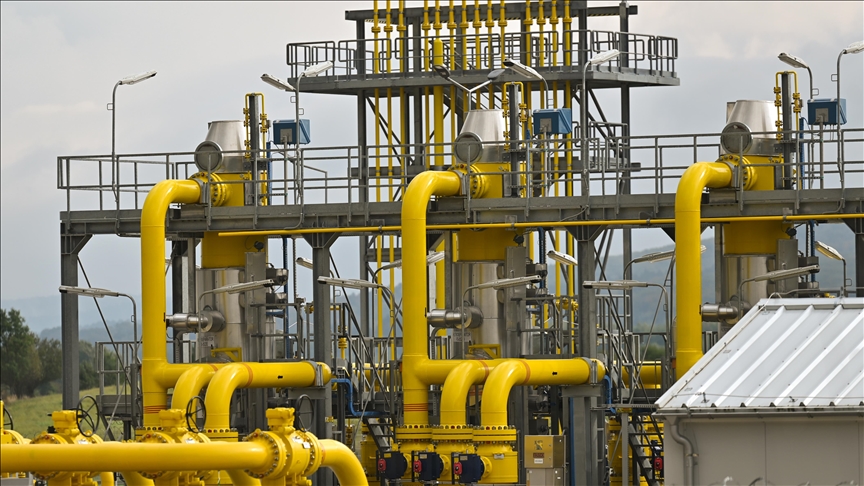
MOSCOW
As Russia significantly loses Europe as its top market in natural gas exports, the country needs international partners and billions of dollars of investment to direct its shipments to Asian markets.
According to the information compiled by Anadolu Agency from various institutions, Russia, one of the world's largest natural gas exporters, sold a total of 202 billion cubic meters of natural gas through pipelines to overseas last year.
Some 83% of Russian gas exports were shipped to Europe and Türkiye, 13% was sent to the Commonwealth of Independent States, and 4% to China in 2021.
Russia's market share in Europe's natural gas imports was around 40% last year.
After the onset of the Russian war on Ukraine, the gas shipment to Europe fell significantly.
Russia's Gazprom shut the Nord Stream 1 pipeline, which supplies gas to Europe, at the end of August, citing maintenance work, and the Nord Stream 2 line, the construction of which was completed, was not put into use due to the war.
Gas deliveries via the pipelines crossing the Baltic Sea were suspended due to Sept. 26 explosions and leaks.
On May 10, gas shipments dropped to 96 million cubic meters after Gazprom spokesman Sergey Kupriyanov confirmed that Ukraine said it would stop purchasing Russian gas from the Sokhranivka entry point.
A day after the statement from Gazprom, the volume of natural gas sent to Europe via Ukraine decreased 25% to 72 million cubic meters.
On May 12, Gazprom announced it would no longer use the Polish section of the Yamal-Europe pipeline, which carries natural gas to Europe.
The Yamal-Europe pipeline is known as one of the most important lines for the transmission of Russian gas to Europe, along with the Nord Stream pipeline and pipelines in Ukraine.
With those developments, the shipment of Gazprom gas via Ukraine dropped to 49.3 million cubic meters on May 17, representing a 50% decline compared to a week earlier.
On Sept. 9, European Commission President Ursula von der Leyen said the EU had supplied 40% of its natural gas from Russia before the war in Ukraine broke out and that it fell to 9% recently.
Gazprom's gas exports dropped 40.4% year-on-year to 86.9 billion cubic meters in the first nine months of 2022.
Russia's main target market China
Russia plans to compensate Europe with natural gas shipments to the Asian market, especially to China.
On April 14, Russian President Vladimir Putin instructed the government to prepare for turning supplies of energy resources to the East amid the West's plan to stop buying them.
Russia's only export pipeline to Asia, which is heavily dependent on Europe for natural gas exports, "Power of Siberia," has not reached full capacity yet.
While it is planned to deliver 38 billion cubic meters of natural gas from Russia to China through this pipeline once it reaches full capacity, this volume corresponds to only 25% of the annual average of 150 billion cubic meters of gas sent to Europe before the war.
The Power of Siberia 2 pipeline is expected to be operational by 2030.
Strategic importance of LNG growing
Liquefied natural gas exports are of strategic importance for Russia, which has lost a significant amount of its gas export market via its pipelines in Europe.
According to Russia's Federal Service for State Statistics, the country's LNG production jumped 13.5% on an annual basis to 21.6 million tons in the first eight months of this year, while it surged 59% year-on-year to 2.4 million tons in August.
Sakhalin-2 in the east of the country and Yamal LNG facilities in the northeast of Siberia stand out as Russia's most important LNG production hubs.
While 10.4 million tons of LNG was produced at Sakhalin-2 last year, the figure was 20 million tons at Yamal LNG.
According to a plan approved by the Russian government in March 2021, LNG production is aimed at 120-140 million tons per year by 2035, with a global market share of 15% to 20%.
Before the start of war, the main partners of Sakhalin-2 were Gazprom with 50% share, Shell with 27.5%, Mitsui with 12.5%, and Mitsubishi with 10%. Shell, however, announced in September that it would withdraw from the project.
While the partnership structure in Yamal LNG was 50.1% Novatek, 20% TotalEnergies, 20% CNPC, and 9.9% Silk Road Fund, TotalEnergies announced that they would no longer be involved in joint projects with Russia.
On the other hand, Baker Hughes, the US energy field service company, which plays an important role in the development of LNG projects in Russia, also decided to stop the equipment shipments to Russia.
Economists in Russia agree that the Russian LNG industry was heavily dependent on equipment from Western companies before the sanctions, and it is unlikely that the state will make rapid progress in this area without allocating large resources.
The last alternative that Russia put forward to export its natural gas to foreign markets was to establish a natural gas center in Türkiye.
A natural gas hub can be established in Türkiye for gas coming from Russia to Europe, Putin said last week.
Anadolu Agency website contains only a portion of the news stories offered to subscribers in the AA News Broadcasting System (HAS), and in summarized form. Please contact us for subscription options.







